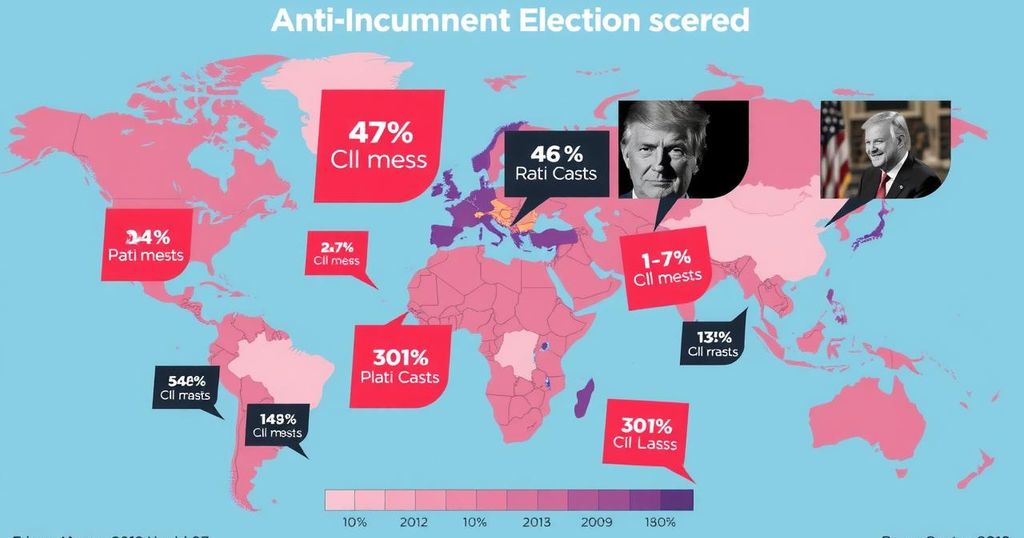2024: A Year of Global Anti-Incumbent Sentiment and the Call for Hope in Governance

In 2024, a global trend of anti-incumbency emerged, with leaders losing elections or being ousted. Key examples include significant defeats in nations like Senegal and South Africa, largely driven by economic concerns and social media dynamics. To regain trust, political leaders need to foster hope and engage directly with citizens while focusing on long-term economic growth and innovative policies that empower the populace.
In 2024, a significant anti-incumbent trend was observed globally, as established political leaders were displaced through elections or popular uprisings. This wave of electoral change highlights a critical observation by Mohammad Al Gergawi, the United Arab Emirates’ Minister of Cabinet Affairs, who stated, “The role of government is to design a future which gives citizens hope.” This underscores the necessity for political leaders to transition from mere crisis management to devising forward-looking agendas.
The wave of anti-incumbency has been remarkable, showcasing noteworthy examples such as the ousting of Senegalese President Macky Sall in March. Similarly, the African National Congress in South Africa lost its majority for the first time in thirty years in June, while Prime Minister Narendra Modi’s party in India also failed to retain its parliamentary majority. These patterns continued through subsequent months, with the Labour Party in the United Kingdom winning a landslide victory in July, indicating a significant shift in voter sentiment and trust.
In Japan, the ruling Liberal Democratic Party lost its majority in October, while Michel Barnier in France was ousted through a no-confidence vote, marking a significant political shift. Other leaders faced removal through popular revolts, as seen when Bangladeshi Prime Minister Sheikh Hasina fled her residence amid protests and Bashar al-Assad of Syria sought refuge in Russia following his regime’s collapse.
A potential contributing factor to this anti-incumbent sentiment could be the influence of social media. Studies indicate that increased internet access often leads to a decline in trust towards governments and amplifies political polarization. For instance, in the United States, voters from both major parties have become increasingly divided, becoming deeply entrenched in their respective ideologies. Social media tends to connect individuals with similar viewpoints, reinforcing their existing beliefs through echo chambers, which can exacerbate divisions and propel conspiracy theories.
Nevertheless, recent election outcomes reveal that despite the growing support for far-right populists on social media, this alone is inadequate for achieving electoral success. Mainstream parties in nations such as Mexico, Spain, Greece, Ireland, and South Africa managed to secure victories, albeit under challenging circumstances. This suggests that a more effective approach to communication via social media is needed for incumbents.
Political leaders must engage with their constituents effectively, responding to their concerns. For instance, advisers to Prime Minister Keir Starmer in the UK sought residents’ perceptions of the government, receiving stark feedback that encapsulated feelings of irrelevance and distrust. Furthermore, for governments to restore public confidence, addressing economic growth and empowering citizens is imperative. A study on the political economy of populism firmly indicates that economic circumstances, such as job losses and cuts to social services, can significantly shape public opinion.
The different performances of incumbent leaders across Europe in the past elections reveal that economic stability is a critical factor. Nations like Spain and Greece experienced economic growth, leading to the re-election of their leaders, whereas Germany faced a contraction, precipitating political turmoil.
Looking beyond mere electoral cycles, political leaders must propose bold, visionary plans capable of instilling hope amid rising living costs and a pervasive sense of powerlessness. History has shown that remarkable government initiatives often emerge during economic hardships, as exemplified by the New Deal in the United States and Britain’s welfare state.
Political leaders should strive to connect with visionaries, in both the public and private sectors, fostering discussions that go beyond short-term solutions and budgetary constraints. A politics centered on hope is crucial to renewing faith in democratic governance, as evidenced by input from Grimsby residents who expressed a desire for a government that is realistic, meaningful, passionate, hopeful, and empowering. Thus, to regain the trust of the electorate, it is essential for leaders to align policies with these aspirations and actively restore public confidence in democratic institutions.
The global political landscape has witnessed a significant anti-incumbent surge, where established leaders have faced electoral defeats or have been removed through civil unrest. This series of events has underscored the opinion that governments should play a proactive role in fostering a hopeful future for their citizens. The correlation between social media’s influence on public opinion and the political fortunes of incumbents is a prevailing theme, which suggests that modern leaders must adapt their strategies to engage effectively with their constituents.
In conclusion, the anti-incumbent wave of 2024 is indicative of a broader discontent with traditional political structures, propelled by social media and economic dissatisfaction. Political leaders must embrace a proactive approach, emphasizing hope and empowerment to restore public trust. By engaging meaningfully with citizen concerns and outlining ambitious, forward-thinking agendas, they can navigate the shifting political landscape and re-establish their legitimacy among voters.
Original Source: www.aspistrategist.org.au








